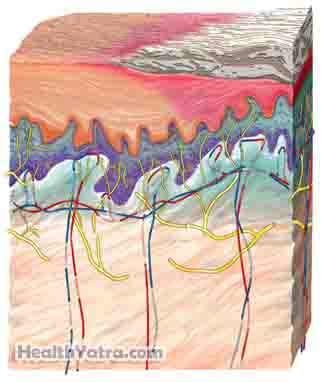Definition
Lichen planus is a chronic skin condition. It causes itchy, flat, scaly patches on the wrists, legs, trunk, or genitals. It can also affect the inside of the mouth and vagina. There it resembles a white spider web. It may ulcerate. Rarely, it can also become cancerous. The scalp and fingernails can also be affected. It may become wart-like in thickness. Lichen planus may continue on and off for months or years. Scratching makes this condition worse.

Causes
Not much is known about the cause. It is one of many skin diseases brought on by certain medications or diseases.
Risk Factors
Lichen planus is more likely to occur in the presence of:
- Hepatitis C
- Systemic lupus erythematosus
- Certain prescription medications
- Graft vs. host disease
The condition is more common in females. It is also more common and in those 30 to 60 years old. Lichen planus is rare in children and the elderly.
Symptoms
Many skin and mucus membrane conditions appear similar. Only your doctor can tell them apart. If you have anything resembling lichen planus, do not assume that is the condition. Skin conditions may be isolated, or they may be signs of a more serious internal disease. See your doctor to be sure.
Symptoms include:
- Itching, flat-topped purplish bumps or scaly patches
- Especially on the palm side of the wrists, the top of the foot and shins, the trunk, or the genitals
- Milky-white, spider web-like patches in your mouth or vagina
Diagnosis
Your doctor will ask about your symptoms, medications, and medical history. A physical exam will be done. You may be referred to a dermatologist.
If the diagnosis is unclear, a skin biopsy may be done.
Treatment
Talk with your doctor about the best plan for you. Treatment options include the following:
Symptom Relief
- Topical or oral antihistamines to relieve itching
- Other topical anti-itching products (pramoxine, menthol, eucalyptus oil)
- Soothing soaks (oatmeal, Burows solution 1:40)
Steroid Medications
Topical steroids may be used to help decrease inflammation. Steroids may also be injected by a needle directly into a lesion. Oral or IV steroids are only used in severe cases.
Other Treatments
- Retinoids or immunomodulating medications may be useful, particularly for lesions in the mouth
- Ultraviolet light combined with oral medication has also been effective in widespread or resistant cases
Prevention
There is no known way to prevent lichen planus. Avoid any medications that may have triggered it in the past.
